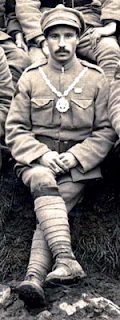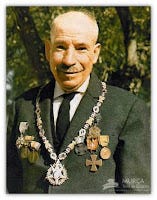Fullbore Friday
a plucky Portuguese soldier
A little WWI FbF I first published in 2017.
Portugal in WWI? Yes, little Portugal fought with the allies in WWI and by all reports she more than held her own fighting in Africa and Europe alongside the British, French, and Belgian forces.
There was one standout; the Million Man Soldier, Anibal Milhais.
...on 9 April the Germans launched Operation Georgette, the second of their great Spring offensives. The Allied lines were pounded by artillery and lethal gas shells. Faced with eight German Division, the greatly outnumbered and exhausted Portuguese troops were not able to hold their positions.
Two battalions of Portugese soldiers initially stood firm along with 50th Northumbrians and the 51st Highlanders but they were overwhelmed and forced to retreat. Anibal Milhais stayed behind with his machine gun ‘Louisa’ and covered the retreat and so allowed them to regroup. Eventually, his ammunition ran out and he managed to hide in enemy held territory for three days. He rescued a Scottish doctor from drowning in a swamp and together they returned to the British lines where the doctor informed everyone of Private Milhais’ courage. His commanding officer called him ‘Soldado Milhoes’ a soldier worth a million men and henceforth he was known as ‘The Million Man’; he received the highest Portuguese military decoration, the Order of Tower and Sword of Valour, Loyalty and Merit.
...
It was a brutal skirmish. Within a few hours 1,938 men were killed, 5,198 wounded and about 7,000 taken prisoner.
A few months later, Milhais once again displayed outstanding bravery in battle. He single-handedly resisted German troops alone. This time, he was providing cover fire for a Belgian unit. He was helping them retreat safely to a secondary trench. There were no causalities.
According to Milhais,On the 8th [of April] I left the lines and dreamt about my village’s patron saint. The day after I told my friends “I’m happy with the dream I had. I’ve dreamt about my patron saint and she was smiling to me.”
I was drinking coffee when the fighting started. I picked up my machine gun and there we went to the front. I arrived at the top of La Couture, but only one soldier had accompanied me. His nickname – they called him – was “Malha Vacas”. There we were, behind a house that was burning. Everything was on fire. To that soldier I said: “Look, Malha Vacas, our battalion has ran away. Let’s get out of here. Poor fella, barely run. He had moved about 10 meters when a grenade hit him and pulverised him. I kept on running. I entered the shelter and saw no one. I could only see fire around me.
Later, the Germans started advancing over the fields of La Couture. The fields were crowded with people. On the front line they came dressed as Portuguese. They had captured our soldiers and were using their uniforms. As I wasn’t sure, and I had seen five Scots, I went to ask them to do some reconnaissance. Then I ran back to the shelter. When I arrived, the soldiers already were at the top of La Couture, on motorcycles and with tall helmets. Then I was sure they were German. I opened fire and the invaders fell. An hour later another invasion. Again I opened fire, before they could even reach their previous position. A machine gun fires a lot. But later, another invasion came. It wasn’t as big. I cut it down too. I didn’t see Germans after that.
Last year a kind soul took the effort to make a computer animated video of his story.
Milhais survived the war and lived, mostly in poverty, until 1970.
As usual, most nations never rise to the level of service to their people that their people willingly provide to it.
Fullbore.
Just a little side note to Portugal in WWI.
Though she only lost 7,222 in combat, almost 82,000 civilians died due to malnutrition and disease during the war related to the breakdown of trade. When you roll in the civilian deaths, she lost ~1.5% of her population during the war.
The USA? 0.13%.




Good one.
As I age, I am always stunned when reading about and seeing footage of WWI.
How did anyone survive?
Hard to believe Man's inhumanity to Man.
Sadly, it shall never end.
Nice to hear something good about the Portuguese as the big histories usually leave it with the Germans breaking them and pushing a huge gap in the lines.